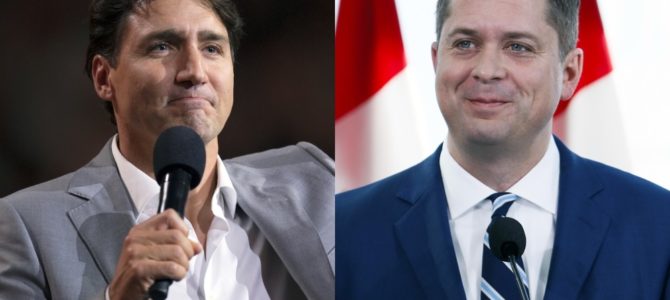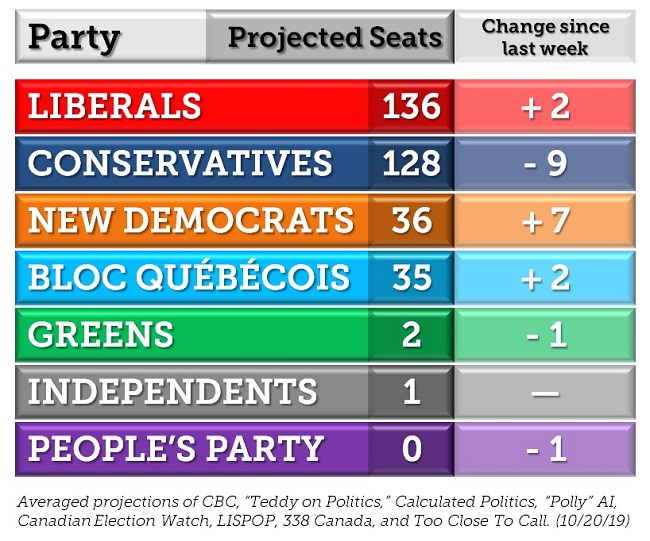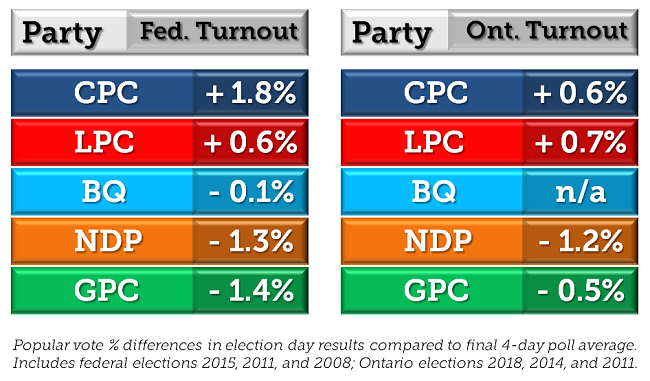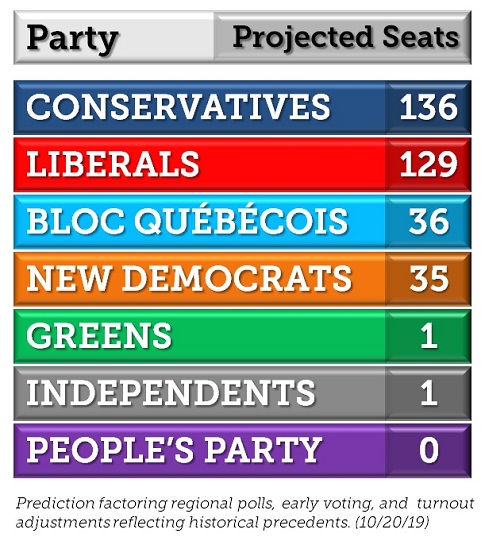
To get you prepared for election night in Canada, here is a breakdown of all the key races and bellwethers to follow, regional analysis, and everything else you’ll need to be informed as the results come in.
A recap of the campaign can be found in parts 1, 2, 3, and 4 of my earlier election coverage. Along with this guide, you can watch the Canadian election returns live on CBC’s YouTube channel.
The Quest For ‘170’ — Becoming Canada’s Prime Minister
To review, at the federal level of Canadian politics, there are 338 “ridings” (Canadian-English for “districts”). While the “magic number” to win the U.S. White House is 270 electoral college votes, a Canadian political party’s leader becomes prime minister if he wins at least 170 seats in parliament. Doing so ensures a majority government and is the ideal scenario.
If no party wins a majority, one precedent keeping with British parliamentary tradition gives the current government the first chance to win the “confidence” of the House of Commons—even if they don’t have the most seats. However, a failed vote of the initial “throne speech” can topple the government. This happened recently in New Brunswick’s provincial election in 2018.
Complicating matters is another precedent wherein the second-place party leader—even an incumbent PM—concedes defeat, steps down as party leader and gives the leader with the most seats the right to try to form a minority government. When Stephen Harper won a plurality in 2006, Liberal Prime Minister Paul Martin did just that.
Many on the left have spent the last three years arguing U.S. President Donald Trump is “illegitimate” because he lost the popular vote. If Conservative Party leader Andrew Scheer wins the popular vote, the most seats, or both, but Liberal PM Justin Trudeau refuses to concede, will these folks sing the same tune? Trudeau is on-record back in 2015 agreeing with Scheer’s position that whoever wins the most seats should be prime minister.
Trudeau may try to cobble together a coalition with the New Democratic Party and the Green Party of Canada to get to 170 even if Scheer wins a plurality of seats. If Trudeau bests him in the final tally, Scheer could attempt to make a deal with the Bloc Québécois. Both men would do well to remember the words of Canada’s last Conservative PM: “Losers don’t get to form coalitions.”
The First Results — Newfoundland and Atlantic Canada
Results from Newfoundland will start streaming in at 7 p.m. ET, followed by Atlantic Canada at 7:30 p.m. ET, which includes the maritime provinces of Nova Scotia, Prince Edward Island, and New Brunswick.
The Liberal Party of Canada is on pace to do very well in Newfoundland and Labrador. One sole outlier (St. John’s East) is projected to go with the NDP. If the NDP swipes St. John’s South–Mount Pearl from the LPC as well, that could portend a decent night for NDP leader Jagmeet Singh.
In P.E.I., the Conservative Party of Canada needs to count on winning the riding of Egmont. A loss there may be a bad sign for future toss-ups later in the evening. There’s a chance the CPC could steal Charlottetown from the Liberals if the NDP and GPC can pry enough votes from the LPC.
In Nova Scotia, Sackville–Preston–Chezzetcook features a battle between the LPC and NDP. Both Central Nova and West Nova should be well-fought contests between the Liberals and Conservatives.
The CPC hopes to peel off at least five seats from the LPC in New Brunswick. Victories in Saint John–Rothesay or Fredericton would bode well for Conservative fortunes while an LPC “hold” in Miramichi–Grand Lake would be a positive sign for Trudeau.
Quebec: The Bloc Strikes Back?
Polls close in Quebec at 9:30 p.m. ET. It’s in Canada’s French-speaking province that you’ll find Beauce, the home district of People’s Party of Canada leader Maxime Bernier. Bernier is in a tight race against CPC challenger Richard Lehoux. If Bernier loses, it means PPC support across the country has moved back to the CPC, a result that would vindicate Conservative Party bosses who opted for Scheer instead of Bernier during a contentious leadership campaign.
Harper was able to form a minority government in 2006 by winning just 38 percent of the seats in Ontario, but his passable showing in the province was supported by a large Bloc Québécois vote in Quebec that stymied the Liberals. As in 2006, a strong BQ performance would help Scheer win a plurality. If the Bloc seat count in Quebec doesn’t crack at least 32, Scheer’s path to victory will be challenging.
While Trois-Rivières is currently an NDP seat, most polls began saying it’s a race between the LCP and BQ. A late-breaking poll from Mainstreet Research, however, shows that Yves Lévesque—the former mayor of the city—has taken the lead. A CPC win in Trois-Rivières would be a “steal,” as it’s a seat they were never really counting on.
Ontario Is the ‘Crown Jewel’ of Canadian Federal Politics
As results come in from Ontario at 9:30 p.m. ET, the outcome of the election could become clearer. Ontario holds 121 of the 338 seats in Canada’s parliament. It’s hard to envision a scenario where any party can win the election without a moderate showing in nation’s most populated province.
It’s been clear for the duration of the race the “905” region outside Toronto will be pivotal. Mississauga–Lakeshore and Mississauga–Streetsville will indicate how the “905” will break.
Elsewhere in Ontario, Peterborough–Kawartha as well as the frequently renamed riding of Northumberland–Peterborough South have aligned with the eventual prime minister for more than 25 years. If Conservative Philip Lawrence can win his race against Liberal incumbent Kim Rudd, it bodes well for Scheer’s odds.
The polls have the Liberals maintaining a lead in the province. Realistically, the CPC must win at least 46 seats in Ontario to keep pace with Harper’s minority result in 2006.
If, however, the Conservatives can win an Ontario seat count in the 50s, the corresponding drop for the Liberals would make it hard for the LPC to exceed 130 seats overall and increase pressure on Trudeau to step down.
The West: The Bastion of the Conservative Party
It’s not a question of whether the Conservative Party will do well in Canada’s Western provinces, it’s only a question of how massive the victory will be when results come in from the West at 9:30 p.m. ET.
All of Alberta’s 34 seats could conceivably end up in CPC hands. Calgary Skyview is the sole chance for a Liberal seat in the province. In Edmonton Strathcona, the Green Party’s candidate dropped out of the race with five days to go and endorsed the NDP, improving their odds.
In Manitoba, Churchill–Keewatinook Aski boasts the largest percentage of aboriginal people in the country (61.1 percent) and appears securely in the hands of the NDP. It’s unlikely any party will take the riding from Niki Ashton, who has held the seat since she was first elected in 2008 at the age of 26.
Saskatchewan features two ridings to keep an eye on. The CPC will face off against the NDP In Regina–Lewvan at the same time they try to defeat Liberal Public Safety Minister Ralph Goodale in Regina–Wascana.
Conservatives appear to be “riled up” in Saskatchewan to an unusual degree. The enthusiasm may stem from the chance to make Scheer the first prime minister to represent Saskatchewan (Regina–Qu’Appelle) since John Diefenbaker became PM in 1957. If the CPC is doing well on election night, there’s a chance they could sweep all 14 of Saskatchewan’s seats.
End of the Frontier: The British Columbia ‘Wildcard’
At 10 p.m. ET, results will break from British Columbia, the province pollsters are least certain about. Judging by how close the final seat projections are, Canada’s most westward province may help put one party over the edge, or help “replace” hard-fought seats lost in Ontario, tightening the race.
B.C. has a little for everyone, and all parties except the PPC should score some victories. GPC leader Elizabeth May should win her party’s only truly safe seat in the riding of Saanich–Gulf Islands.
In Vancouver Granville, Jody Wilson-Raybould (affectionately known as “JWR”) is fighting to remain in Parliament as an Independent. Wilson-Raybould last served as a Liberal MP in Trudeau’s cabinet until she left as a result of the SNC-Laval scandal and her view that Trudeau inappropriately interfered with the Canadian justice system.
All three seats in the Canadian North lean Liberal, but all the main parties are competitive.
Final Predictions
The final average of seat projections from 338 Canada, Canadian Election Watch, Calculated Politics, Too Close To Call, “Polly” AI, LISPOP, Teddy on Politics, and the CBC predicts a minority government for Justin Trudeau’s Liberal Party.

Fear of vote-splitting and the “cold-feet” voters seem to get for smaller parties leads Canadian pollsters to overestimate support for the NDP and GPC. But what about the other parties? I looked at the final poll of each major pollster within four days of an election and compared their predictions with the actual results.
After analyzing data from the last three Canadian federal elections as well as Ontario’s last three provincial elections, here’s how the various parties performed compared to final polls.

Applying what we know from early voting, regional polling figures for each province, and a turnout adjustment reflecting historical precedents provides a set of predictions I believe will be closer to the mark.

These adjustments to the model benefit the Conservatives and creates a scenario where Scheer’s CPC would win the most seats in parliament. As discussed, however, whether this outcome would lead to him becoming prime minister of Canada is another question. Frankly, a government formed under either above scenario would be apt to fall within two years or less, leading Canadians back to the polls.
The Only Poll That Counts is the One on Election Day
Liberals are hoping that Trudeau’s last-minute endorsement from former U.S. president Barack Obama moved the needle in the Canadian PM’s photo-finish battle with Scheer. The little polling conducted on the endorsement seems to indicate it has. Yet would Trudeau have needed a “hail Mary” if he was entirely sure of victory?
“Voter certainty” is also something to keep in mind. According to pollster Angus Reid, 73 percent of Conservative supporters say they will “absolutely” vote for the Conservative Party no matter what, compared to just 45 percent of Liberals and 35 percent of New Democrats. Just as some NDP and GPC will likely vote LPC at the last minute to block Scheer, there’s a chance PPC voters may “come home” to the CPC in order to oust Trudeau. Conversely, the PPC staying at 2 percent federally could cost Scheer the election.
Like with Brexit and the U.S. 2016 presidential election, Canadian pollsters may have also missed key data this time around. Polling in an age of cell phones is complicated. The absolute failure of Australian pollsters in the 2019 Australian federal election illustrates this all too well. The number of “toss-up” races throughout the country and the number of competitive races in Quebec and Ontario means that both the Liberal and Conservative seat projections carry a margin of error of upwards of 45 seats in either direction.
One thing we can firmly say going into tonight’s election: it’s been one heck of a ride.









